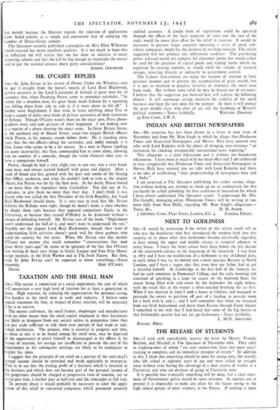MR. O'CASEY REPLIES Sta,—St. John Ervine in his review of
Drums Under the Windows, says he got it straight from the horse's mouth of Lord Basil Blackwood, private secretary to the Lord Lieutenant of Ireland (a great man by all accounts) that, when Paudruig Pearse came to announce surrender, " he reeled like a drunken man, his great head, made hideous by a squinting eye, lolling about from side to side as if it were about to fall off." I hereby warn Englishmen if they want to learn anything about Eire to keep a couple of miles away from all private secretaries of lords lieutenant of Ireland. Though O'Casey wasn't there on the exact spot, Press photo- graphers were, and took pictures of what happened. I am looking now at a reprint of a photo showing the exact scene. In Great Britain Street, at the northern end of Moore Street, stand two elegant British officers while Pearse, in his topcoat, stands before them. He is standing more erect that the two officers taking the surrender, and, oddly enough, it is Gm. Lowe who seems to be a bit uneasy. In a note to Pearse (spelling his name incorrectly), this Gen. commanded him to come alone, allowing him no comfort of a comrade, though the victor General takes care to have a companion himself.
Pearse, though he had a very slight cast in one eye, was a very hand- some man, and always carried himself with grace and dignity. After a week of blood and fire, grimed with the dust and smoke of the blazing Post Office, unshaven, and tired, he couldn't look so trim as the elegant officers, but Pearse was by far the finer man. As for death, Pearse feared it no more than the legendary hero, Cuchullain. Nor did any of his comrades, to give them no more than their due. I don't think it was Pearse who was called the first President of the Irish Republic, but Lord Basil Blackwood should know. It is very nice to read that Mr. Ervine believes the Bishops were right, though he doesn't make it clear whether he thinks them right because they opposed compulsory Gaelic in the University, or because they caused O'Hickey to be dismissed without a chance of defending himself. Mr. Ervine says of the book, " Englishmen won't understand the half of it, and won't want to understand the rest." Possibly not the elegant Lord Basil Blackwoods, though their want of understanding Irish activities doesn't speak well for these gayboys who ruled the country for 70o years. When Mr. Ervine says that neither O'Casey nor anyone else could remember " conversations that took place thirty years ago," he seems to be ignorant of the fact that O'Casey was writing of these very things in Gaelic League and Sinn Fein Manu- script journals, in the Irish Worker and in The Irish Nation. But then, even St. John Ervine can't be expected to know everything.—Yours


























 Previous page
Previous page